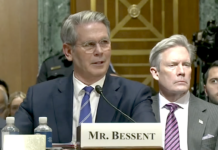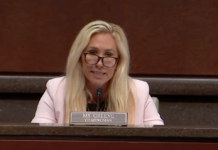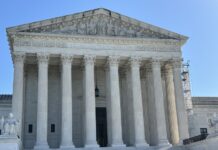
Gov. Brian Kemp and Attorney General Chris Carr continued Georgia’s feud over federal vaccine mandates that now extend to workers in hospitals, nursing homes, and other health care facilities.
A lawsuit filed Tuesday by the state’s two ranking Republican officials challenges the legality of the Biden administration’s requirement that the majority of health care workers get fully vaccinated by Jan. 4. The U.S. District Court suit comes as Georgia and the rest of the nation deals with an alarming shortage of health care workers lost partly to burnout and stress throughout the pandemic.
Georgia officials predicted dire shortages of workers in senior care facilities when the Biden administration announced vaccine requirements in late summer.
Georgia joins Louisiana, Montana, Arizona and Alabama among the 12 states seeking an injunction preventing the Centers for Medicare and Medicaid Services from enforcing the mandate. The suit argues that COVID-19 vaccine mandates are unlawful and unconstitutional including a claim the Tenth Amendment limits the federal government’s ability to mandate vaccines.
Kemp is laying some of the blame for an ongoing workforce shortage on the mandates pushing people out of the profession to escape being forced to take the vaccines.
Senior care facility managers are struggling to balance their desire for COVID-19 safety precautions with a need for workers who are resisting the vaccines.
“We believe COVID-19 vaccinations are critical to ensuring the safety of the vulnerable individuals residing in nursing centers, and we appreciate efforts to increase uptake in long-term care,” said Devon Barill, director of communications for a Georgia senior care industry association. “However, we are concerned that the mandate could exacerbate the significant workforce crisis long-term care communities are already experiencing.”
Because the mandate would apply to all facilities that treat Medicare and Medicaid patients, it covers the vast majority of the nation’s hospitals, home health care services and other medical service providers that depend on federal payments.
Additionally, Kemp and Carr are fighting in district court federal vaccination mandates for employers with 100 or more employees and federal contractors.
“After health care heroes went above and beyond the call of duty to keep Americans safe and healthy throughout the COVID-19 pandemic, Joe Biden is now threatening their livelihood if they refuse COVID-19 vaccination,” Kemp said. “Yet another unlawful mandate from this administration will only worsen worker shortages in a critical-need area as we continue to balance the everyday health care needs of hardworking Georgians and fighting COVID-19.
“We will continue to fight this repeated, unconstitutional overreach by Joe Biden and his administration in court,” Kemp added.
The Biden administration and organizations like the American Hospital Association are pushing the mandates as a necessary public safety protocol that many hospital systems and other health care providers have instituted on their own that have delivered a declining rate of infection deaths in Georgia and across the country.
Across the nation, about 761,000 people have died due to COVID-19 complications.
In Georgia, many nursing homes already require vaccinations for their staff, while Atrium Health, Emory Healthcare, Piedmont Healthcare and Wellstar Health System are some of the largest hospital systems that do so.
However, HCA Healthcare and some of the other providers encouraged their staff to get immunizations but stopped short of requiring them until the federal government intervened earlier this month.
The Georgia Health Care Association and the Georgia Center for Assisted Living, the state’s largest organization representing long-term care providers, support the health benefits of the vaccine but are worried about the ramifications of a mandate, said Barill.
Her organization reports about 75% of nursing home staff have received at least one COVID-19 vaccination dose.
She said the associations hope to continue working with the federal and state governments to develop solutions to the labor shortage once the mandate takes effect.
“It is important to note that, while centers can mitigate the risk for COVID-19 via routine testing and proper infection control, there is little they can do to address the absence of employees to provide care to their residents,” Barill said.
Health care officials told the state House Committee on Human Relations and Aging Tuesday that their industry cannot survive with the high costs of contract nursing, a high nursing turnover, and the likelihood of blowing past the pre-pandemic projections that more than 1 million nurses will retire by the end of the decade.
The health care experts at Tuesday’s hearing did not directly bring up the vaccine mandate but noted how the pandemic has increased the stress on employees, ramped up costs and reliance on contract nurses and put more strain on medical providers in large metropolitan areas.
Rural communities, where resources are already limited for basic medical care and senior care, face an even greater challenge.
Dave Lamb, president of Home Care Association of America, says the 13% decline in registered certified nursing assistants over the last 18 months makes it more difficult to help the 400,000 Georgians who receive care at home and in their community.
And during the past two years, the number of requests for staffing assistance has jumped from 8,000 to 44,000, said Anna Adams of the Georgia Hospital Association.
“If a new business said we’re bringing 12,500 jobs to Georgia, it’d be front page news and everybody would be so excited about that,” Adams said. “We have that right now, but we don’t have enough people trained who are willing to step into those roles, and we don’t have the ability to train them under our current system.”
Deb Bailey, executive director of government affairs at Northeast Georgia Medical Center, said that even with the state providing millions to help pay for nursing care, it is not enough to resolve all of the problems.
“We’re very sensitive that nurses are now caring for more patients than they should and that’s very difficult for them both physically, psychologically and emotionally,” she told the House committee members.
When the Centers for Medicare and Medicaid Services issued the rule on Nov. 5, American Hospital Association President and CEO Rick Pollack said it would create a level playing field for health care organizations by streamlining compliance requirements. The Centers for Medicare and Medicaid Services have also noted that hospitals with their own mandates have not experienced workers quitting on a large-scale because of their vaccine policies.
“AHA has been supportive of hospitals that call for mandatory vaccination of health care workers in order to better protect patients and the communities we serve,” Pollack said.







